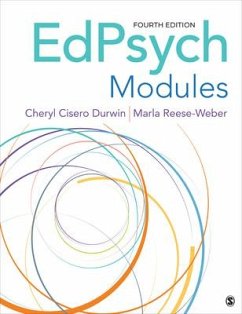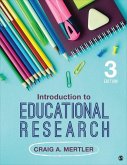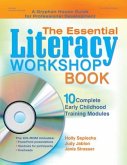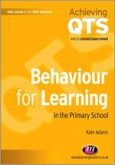- Broschiertes Buch
- Merkliste
- Auf die Merkliste
- Bewerten Bewerten
- Teilen
- Produkt teilen
- Produkterinnerung
- Produkterinnerung
EdPsych Modules uses an innovative modular approach and case studies based on real-life classroom situations to address the challenge of effectively connecting theory and research to practice. Succinct, stand-alone modules are organized into themed units and offer instructors the flexibility to tailor the book's contents to the needs of their course. The units begin with a set of case studies written for early childhood, elementary, middle, and secondary classrooms, providing readers with direct insight into the dynamics influencing the future students they plan to teach. All 25 modules…mehr
Andere Kunden interessierten sich auch für
![Introduction to Educational Research Introduction to Educational Research]() Craig A MertlerIntroduction to Educational Research199,99 €
Craig A MertlerIntroduction to Educational Research199,99 €![Leading with Communication Leading with Communication]() Teri Kwal GambleLeading with Communication157,99 €
Teri Kwal GambleLeading with Communication157,99 €![Leadership Leadership]() Peter G NorthouseLeadership170,99 €
Peter G NorthouseLeadership170,99 €![The Essential Literacy Workshop Book The Essential Literacy Workshop Book]() Holly SeplochaThe Essential Literacy Workshop Book35,99 €
Holly SeplochaThe Essential Literacy Workshop Book35,99 €![Educational Psychology in Context Educational Psychology in Context]() Bruce A MarloweEducational Psychology in Context153,99 €
Bruce A MarloweEducational Psychology in Context153,99 €![Secondary Education Reflective Reader Secondary Education Reflective Reader]() Jonathan SavageSecondary Education Reflective Reader63,99 €
Jonathan SavageSecondary Education Reflective Reader63,99 €![Behaviour for Learning in the Primary School Behaviour for Learning in the Primary School]() Kate AdamsBehaviour for Learning in the Primary School43,99 €
Kate AdamsBehaviour for Learning in the Primary School43,99 €-
-
-
EdPsych Modules uses an innovative modular approach and case studies based on real-life classroom situations to address the challenge of effectively connecting theory and research to practice. Succinct, stand-alone modules are organized into themed units and offer instructors the flexibility to tailor the book's contents to the needs of their course. The units begin with a set of case studies written for early childhood, elementary, middle, and secondary classrooms, providing readers with direct insight into the dynamics influencing the future students they plan to teach. All 25 modules highlight diversity, emphasizing how psychological factors adapt and change based on external influences such as sex, gender, race, language, disability status, and socioeconomic background. The Fourth Edition includes over three hundred new references across all 25 modules, and expanded coverage of diversity in new diversity-related research. Also available as a digital option (courseware). Learn more about EdPsych Modules -Vantage Digital Option, Fourth Edition [ISBN: 978-1-0718-2814-4]
Hinweis: Dieser Artikel kann nur an eine deutsche Lieferadresse ausgeliefert werden.
Hinweis: Dieser Artikel kann nur an eine deutsche Lieferadresse ausgeliefert werden.
Produktdetails
- Produktdetails
- Verlag: Sage Publications
- 4th edition
- Seitenzahl: 712
- Erscheinungstermin: 24. Januar 2020
- Englisch
- Abmessung: 274mm x 208mm x 15mm
- Gewicht: 771g
- ISBN-13: 9781544373553
- ISBN-10: 1544373554
- Artikelnr.: 58295270
- Herstellerkennzeichnung
- Libri GmbH
- Europaallee 1
- 36244 Bad Hersfeld
- gpsr@libri.de
- Verlag: Sage Publications
- 4th edition
- Seitenzahl: 712
- Erscheinungstermin: 24. Januar 2020
- Englisch
- Abmessung: 274mm x 208mm x 15mm
- Gewicht: 771g
- ISBN-13: 9781544373553
- ISBN-10: 1544373554
- Artikelnr.: 58295270
- Herstellerkennzeichnung
- Libri GmbH
- Europaallee 1
- 36244 Bad Hersfeld
- gpsr@libri.de
Cheryl Cisero Durwin received her PhD in Educational Psychology at the University of Massachusetts, Amherst in 1996. She is Professor of Psychology at Southern Connecticut State University. She has taught educational psychology for over 20 years in various formats, such as graduate-level and undergraduate courses ranging from midsize sections of 40 students to small, writing-intensive sections. Cheryl regularly teaches courses in research design, testing, motivation, cognition and memory, and learning disabilities. Her research interests include the development, assessment, and remediation of reading skills, efficacy of reading interventions in disadvantaged populations, and college-level teaching and learning. Marla Reese-Weber received her PhD at The Ohio State University in 1998. She is Professor of Psychology and serves as the associate dean in the College of Arts and Sciences at Illinois State University. She has taught educational psychology for over 17 years in sections as small as 25 students and as large as 150 students. In addition, her course on educational psychology has included a focus on underserved populations, particularly in urban areas. Marla also teaches adolescent development at the undergraduate and graduate levels, as well as a course on developmental research methods. Her research interests include sibling and dating violence as well as romantic relationship development during emerging adulthood.
Preface
Diversity Table
Digital Resources
About the Authors
Introduction
Module 1: Using Science to Inform Classroom Practices
Educational Psychology: A Resource for Teachers
Educational Psychology: The Science
Educational Psychology: Classroom Practices
Summary
Key Concepts
Case Study: Reflect and Evaluate
Unit 1: Personal Development
Unit 1: Case Studies
Module 2: Contexts of Development
Bronfenbrenner's Bioecological Theory
Family Context
Peer Context
Broader Contexts
Summary
Key Concepts
Case Studies: Reflect and Evaluate
Module 3: Social-Emotional Development
Erikson's Psychosocial Theory
Aspects of Identity
Understanding the Self
Social Competence
Summary
Key Concepts
Case Studies: Reflect and Evaluate
Module 4: Moral Development
Cognitive-Developmental Moral Reasoning
Prosocial Behavior
Aggressive Behavior
Summary
Key Concepts
Case Studies: Reflect and Evaluate
Unit 2: The Developing Learner
Unit 2: Case Studies
Module 5: Brain Development
Influence of Neuroscience on Education
Neuroscience 101
Brain Mechanisms During Learning
Summary
Key Concepts
Case Studies: Reflect and Evaluate
Module 6: Cognitive Development
Constructivist Theories of Cognitive Development
Issues in Cognitive Development: Piaget and Vygotsky
Summary
Key Concepts
Case Studies: Reflect and Evaluate
Module 7: Language Development
Understanding Language Acquisition
Development of Language Skills
Summary
Key Concepts
Case Studies: Reflect and Evaluate
Unit 3: Learning Theories
Unit 3: Case Studies
Module 8: Behavioral Learning Theories
Assumptions of Behavioral Learning Theories
Classical Conditioning
Operant Conditioning
Summary
Key Concepts
Case Studies: Reflect and Evaluate
Module 9: Social Cognitive Theory
Assumptions of Social Cognitive Theory
Observational Learning
Personal Factors in Learning
Summary
Key Concepts
Case Studies: Reflect and Evaluate
Module 10: Information Processing
Assumptions of the Information Processing Approach
Perception and Attention
Memory
Summary
Key Concepts
Case Studies: Reflect and Evaluate
Unit 4: Cognitive Processes
Unit 4: Case Studies
Module 11: Metacognition
What Is Metacognition and Why Is It Important?
Theory of Mind in Childhood
Egocentrism in Adolescence
Factors Affecting the Development and Use of Metacognition
Summary
Key Concepts
Case Studies: Reflect and Evaluate
Module 12: Transfer of Skills and Knowledge
What Is Transfer, and Why Is It Important?
Do We Readily Transfer What We Learn?
Summary
Key Concepts
Case Studies: Reflect and Evaluate
Module 13: Higher Order Thinking
What Is Higher Order Thinking, and Why Is It Important?
Critical Thinking
Problem-Solving
Creativity
Summary
Key Concepts
Case Studies: Reflect and Evaluate
Unit 5: Motivation
Unit 5: Case Studies
Module 14: Behavioral Theory
A Developmental View of Motivation
Rewarding Students for Learning
Praising Students for Learning
When the Reward Is the Activity Itself
Summary
Key Concepts
Case Studies: Reflect and Evaluate
Module 15: Cognitive Theories
Cognitive Theories of Motivation
Developmental and Cultural Differences in Motivation
Serious Motivational Problems
Summary
Key Concepts
Case Studies: Reflect and Evaluate
Module 16: Self Theories
Self-Efficacy Theory
Self-Worth Theory
Self-Determination Theory
Integrating the Self Theories
Summary
Key Concepts
Case Studies: Reflect and Evaluate
Unit 6: Classroom Management and Instruction
Unit 6: Case Studies
Module 17: Classroom Management
Importance of Classroom Management
Time Management
Relationship Building
Providing Consequences
Bullying
Summary
Key Concepts
Case Studies: Reflect and Evaluate
Module 18: Instruction: Applying Behavioral, Cognitive, and Constructivist
Approaches
Meeting the Needs of Diverse Learners
Teaching Methods Based on Behaviorism
Teaching Methods Based on Cognitive Learning Theory
Teaching Methods Based on Constructivism
Summary
Key Concepts
Case Studies: Reflect and Evaluate
Module 19: Grouping Practices
Grouping by Ability
Cooperative Learning
Summary
Key Concepts
Case Studies: Reflect and Evaluate
Unit 7: Learner Differences
Unit 7: Case Studies
Module 20: Intelligence and Giftedness
Intelligence and Giftedness: More Than "Being Smart"
Assessing Intelligence and Giftedness
Biological, Social, and Cultural Issues
Summary
Key Concepts
Case Studies: Reflect and Evaluate
Module 21: Cognitive Disabilities
Cognitive Disabilities in Today's Classrooms
Intellectual Disabilities
Specific Learning Disabilities
Summary
Key Concepts
Case Studies: Reflect and Evaluate
Module 22: Emotional, Social, and Behavioral Disorders
Emotional, Social, and Behavioral Disorders in Today's Classrooms
Characteristics of Disorders
Summary
Key Concepts
Case Studies: Reflect and Evaluate
Unit 8: Assessment
Unit 8: Case Studies
Module 23: Assessing Student Learning
What Is Assessment?
Planning Assessments
Evaluating Student Performance
Communicating Assessment Information
Summary
Key Concepts
Case Studies: Reflect and Evaluate
Module 24: Test Construction and Use
Characteristics of High-Quality Classroom Tests
Test Preparation
Summary
Key Concepts
Case Studies: Reflect and Evaluate
Module 25: Standardized Tests and Scores
Types of Standardized Tests
Understanding Test Scores
Characteristics of Good Tests
Summary
Key Concepts
Case Studies: Reflect and Evaluate
Appendix: How Does EdPsych Help You Prepare for the Praxis Exam?
Glossary
References
Index
Diversity Table
Digital Resources
About the Authors
Introduction
Module 1: Using Science to Inform Classroom Practices
Educational Psychology: A Resource for Teachers
Educational Psychology: The Science
Educational Psychology: Classroom Practices
Summary
Key Concepts
Case Study: Reflect and Evaluate
Unit 1: Personal Development
Unit 1: Case Studies
Module 2: Contexts of Development
Bronfenbrenner's Bioecological Theory
Family Context
Peer Context
Broader Contexts
Summary
Key Concepts
Case Studies: Reflect and Evaluate
Module 3: Social-Emotional Development
Erikson's Psychosocial Theory
Aspects of Identity
Understanding the Self
Social Competence
Summary
Key Concepts
Case Studies: Reflect and Evaluate
Module 4: Moral Development
Cognitive-Developmental Moral Reasoning
Prosocial Behavior
Aggressive Behavior
Summary
Key Concepts
Case Studies: Reflect and Evaluate
Unit 2: The Developing Learner
Unit 2: Case Studies
Module 5: Brain Development
Influence of Neuroscience on Education
Neuroscience 101
Brain Mechanisms During Learning
Summary
Key Concepts
Case Studies: Reflect and Evaluate
Module 6: Cognitive Development
Constructivist Theories of Cognitive Development
Issues in Cognitive Development: Piaget and Vygotsky
Summary
Key Concepts
Case Studies: Reflect and Evaluate
Module 7: Language Development
Understanding Language Acquisition
Development of Language Skills
Summary
Key Concepts
Case Studies: Reflect and Evaluate
Unit 3: Learning Theories
Unit 3: Case Studies
Module 8: Behavioral Learning Theories
Assumptions of Behavioral Learning Theories
Classical Conditioning
Operant Conditioning
Summary
Key Concepts
Case Studies: Reflect and Evaluate
Module 9: Social Cognitive Theory
Assumptions of Social Cognitive Theory
Observational Learning
Personal Factors in Learning
Summary
Key Concepts
Case Studies: Reflect and Evaluate
Module 10: Information Processing
Assumptions of the Information Processing Approach
Perception and Attention
Memory
Summary
Key Concepts
Case Studies: Reflect and Evaluate
Unit 4: Cognitive Processes
Unit 4: Case Studies
Module 11: Metacognition
What Is Metacognition and Why Is It Important?
Theory of Mind in Childhood
Egocentrism in Adolescence
Factors Affecting the Development and Use of Metacognition
Summary
Key Concepts
Case Studies: Reflect and Evaluate
Module 12: Transfer of Skills and Knowledge
What Is Transfer, and Why Is It Important?
Do We Readily Transfer What We Learn?
Summary
Key Concepts
Case Studies: Reflect and Evaluate
Module 13: Higher Order Thinking
What Is Higher Order Thinking, and Why Is It Important?
Critical Thinking
Problem-Solving
Creativity
Summary
Key Concepts
Case Studies: Reflect and Evaluate
Unit 5: Motivation
Unit 5: Case Studies
Module 14: Behavioral Theory
A Developmental View of Motivation
Rewarding Students for Learning
Praising Students for Learning
When the Reward Is the Activity Itself
Summary
Key Concepts
Case Studies: Reflect and Evaluate
Module 15: Cognitive Theories
Cognitive Theories of Motivation
Developmental and Cultural Differences in Motivation
Serious Motivational Problems
Summary
Key Concepts
Case Studies: Reflect and Evaluate
Module 16: Self Theories
Self-Efficacy Theory
Self-Worth Theory
Self-Determination Theory
Integrating the Self Theories
Summary
Key Concepts
Case Studies: Reflect and Evaluate
Unit 6: Classroom Management and Instruction
Unit 6: Case Studies
Module 17: Classroom Management
Importance of Classroom Management
Time Management
Relationship Building
Providing Consequences
Bullying
Summary
Key Concepts
Case Studies: Reflect and Evaluate
Module 18: Instruction: Applying Behavioral, Cognitive, and Constructivist
Approaches
Meeting the Needs of Diverse Learners
Teaching Methods Based on Behaviorism
Teaching Methods Based on Cognitive Learning Theory
Teaching Methods Based on Constructivism
Summary
Key Concepts
Case Studies: Reflect and Evaluate
Module 19: Grouping Practices
Grouping by Ability
Cooperative Learning
Summary
Key Concepts
Case Studies: Reflect and Evaluate
Unit 7: Learner Differences
Unit 7: Case Studies
Module 20: Intelligence and Giftedness
Intelligence and Giftedness: More Than "Being Smart"
Assessing Intelligence and Giftedness
Biological, Social, and Cultural Issues
Summary
Key Concepts
Case Studies: Reflect and Evaluate
Module 21: Cognitive Disabilities
Cognitive Disabilities in Today's Classrooms
Intellectual Disabilities
Specific Learning Disabilities
Summary
Key Concepts
Case Studies: Reflect and Evaluate
Module 22: Emotional, Social, and Behavioral Disorders
Emotional, Social, and Behavioral Disorders in Today's Classrooms
Characteristics of Disorders
Summary
Key Concepts
Case Studies: Reflect and Evaluate
Unit 8: Assessment
Unit 8: Case Studies
Module 23: Assessing Student Learning
What Is Assessment?
Planning Assessments
Evaluating Student Performance
Communicating Assessment Information
Summary
Key Concepts
Case Studies: Reflect and Evaluate
Module 24: Test Construction and Use
Characteristics of High-Quality Classroom Tests
Test Preparation
Summary
Key Concepts
Case Studies: Reflect and Evaluate
Module 25: Standardized Tests and Scores
Types of Standardized Tests
Understanding Test Scores
Characteristics of Good Tests
Summary
Key Concepts
Case Studies: Reflect and Evaluate
Appendix: How Does EdPsych Help You Prepare for the Praxis Exam?
Glossary
References
Index
Preface
Diversity Table
Digital Resources
About the Authors
Introduction
Module 1: Using Science to Inform Classroom Practices
Educational Psychology: A Resource for Teachers
Educational Psychology: The Science
Educational Psychology: Classroom Practices
Summary
Key Concepts
Case Study: Reflect and Evaluate
Unit 1: Personal Development
Unit 1: Case Studies
Module 2: Contexts of Development
Bronfenbrenner's Bioecological Theory
Family Context
Peer Context
Broader Contexts
Summary
Key Concepts
Case Studies: Reflect and Evaluate
Module 3: Social-Emotional Development
Erikson's Psychosocial Theory
Aspects of Identity
Understanding the Self
Social Competence
Summary
Key Concepts
Case Studies: Reflect and Evaluate
Module 4: Moral Development
Cognitive-Developmental Moral Reasoning
Prosocial Behavior
Aggressive Behavior
Summary
Key Concepts
Case Studies: Reflect and Evaluate
Unit 2: The Developing Learner
Unit 2: Case Studies
Module 5: Brain Development
Influence of Neuroscience on Education
Neuroscience 101
Brain Mechanisms During Learning
Summary
Key Concepts
Case Studies: Reflect and Evaluate
Module 6: Cognitive Development
Constructivist Theories of Cognitive Development
Issues in Cognitive Development: Piaget and Vygotsky
Summary
Key Concepts
Case Studies: Reflect and Evaluate
Module 7: Language Development
Understanding Language Acquisition
Development of Language Skills
Summary
Key Concepts
Case Studies: Reflect and Evaluate
Unit 3: Learning Theories
Unit 3: Case Studies
Module 8: Behavioral Learning Theories
Assumptions of Behavioral Learning Theories
Classical Conditioning
Operant Conditioning
Summary
Key Concepts
Case Studies: Reflect and Evaluate
Module 9: Social Cognitive Theory
Assumptions of Social Cognitive Theory
Observational Learning
Personal Factors in Learning
Summary
Key Concepts
Case Studies: Reflect and Evaluate
Module 10: Information Processing
Assumptions of the Information Processing Approach
Perception and Attention
Memory
Summary
Key Concepts
Case Studies: Reflect and Evaluate
Unit 4: Cognitive Processes
Unit 4: Case Studies
Module 11: Metacognition
What Is Metacognition and Why Is It Important?
Theory of Mind in Childhood
Egocentrism in Adolescence
Factors Affecting the Development and Use of Metacognition
Summary
Key Concepts
Case Studies: Reflect and Evaluate
Module 12: Transfer of Skills and Knowledge
What Is Transfer, and Why Is It Important?
Do We Readily Transfer What We Learn?
Summary
Key Concepts
Case Studies: Reflect and Evaluate
Module 13: Higher Order Thinking
What Is Higher Order Thinking, and Why Is It Important?
Critical Thinking
Problem-Solving
Creativity
Summary
Key Concepts
Case Studies: Reflect and Evaluate
Unit 5: Motivation
Unit 5: Case Studies
Module 14: Behavioral Theory
A Developmental View of Motivation
Rewarding Students for Learning
Praising Students for Learning
When the Reward Is the Activity Itself
Summary
Key Concepts
Case Studies: Reflect and Evaluate
Module 15: Cognitive Theories
Cognitive Theories of Motivation
Developmental and Cultural Differences in Motivation
Serious Motivational Problems
Summary
Key Concepts
Case Studies: Reflect and Evaluate
Module 16: Self Theories
Self-Efficacy Theory
Self-Worth Theory
Self-Determination Theory
Integrating the Self Theories
Summary
Key Concepts
Case Studies: Reflect and Evaluate
Unit 6: Classroom Management and Instruction
Unit 6: Case Studies
Module 17: Classroom Management
Importance of Classroom Management
Time Management
Relationship Building
Providing Consequences
Bullying
Summary
Key Concepts
Case Studies: Reflect and Evaluate
Module 18: Instruction: Applying Behavioral, Cognitive, and Constructivist
Approaches
Meeting the Needs of Diverse Learners
Teaching Methods Based on Behaviorism
Teaching Methods Based on Cognitive Learning Theory
Teaching Methods Based on Constructivism
Summary
Key Concepts
Case Studies: Reflect and Evaluate
Module 19: Grouping Practices
Grouping by Ability
Cooperative Learning
Summary
Key Concepts
Case Studies: Reflect and Evaluate
Unit 7: Learner Differences
Unit 7: Case Studies
Module 20: Intelligence and Giftedness
Intelligence and Giftedness: More Than "Being Smart"
Assessing Intelligence and Giftedness
Biological, Social, and Cultural Issues
Summary
Key Concepts
Case Studies: Reflect and Evaluate
Module 21: Cognitive Disabilities
Cognitive Disabilities in Today's Classrooms
Intellectual Disabilities
Specific Learning Disabilities
Summary
Key Concepts
Case Studies: Reflect and Evaluate
Module 22: Emotional, Social, and Behavioral Disorders
Emotional, Social, and Behavioral Disorders in Today's Classrooms
Characteristics of Disorders
Summary
Key Concepts
Case Studies: Reflect and Evaluate
Unit 8: Assessment
Unit 8: Case Studies
Module 23: Assessing Student Learning
What Is Assessment?
Planning Assessments
Evaluating Student Performance
Communicating Assessment Information
Summary
Key Concepts
Case Studies: Reflect and Evaluate
Module 24: Test Construction and Use
Characteristics of High-Quality Classroom Tests
Test Preparation
Summary
Key Concepts
Case Studies: Reflect and Evaluate
Module 25: Standardized Tests and Scores
Types of Standardized Tests
Understanding Test Scores
Characteristics of Good Tests
Summary
Key Concepts
Case Studies: Reflect and Evaluate
Appendix: How Does EdPsych Help You Prepare for the Praxis Exam?
Glossary
References
Index
Diversity Table
Digital Resources
About the Authors
Introduction
Module 1: Using Science to Inform Classroom Practices
Educational Psychology: A Resource for Teachers
Educational Psychology: The Science
Educational Psychology: Classroom Practices
Summary
Key Concepts
Case Study: Reflect and Evaluate
Unit 1: Personal Development
Unit 1: Case Studies
Module 2: Contexts of Development
Bronfenbrenner's Bioecological Theory
Family Context
Peer Context
Broader Contexts
Summary
Key Concepts
Case Studies: Reflect and Evaluate
Module 3: Social-Emotional Development
Erikson's Psychosocial Theory
Aspects of Identity
Understanding the Self
Social Competence
Summary
Key Concepts
Case Studies: Reflect and Evaluate
Module 4: Moral Development
Cognitive-Developmental Moral Reasoning
Prosocial Behavior
Aggressive Behavior
Summary
Key Concepts
Case Studies: Reflect and Evaluate
Unit 2: The Developing Learner
Unit 2: Case Studies
Module 5: Brain Development
Influence of Neuroscience on Education
Neuroscience 101
Brain Mechanisms During Learning
Summary
Key Concepts
Case Studies: Reflect and Evaluate
Module 6: Cognitive Development
Constructivist Theories of Cognitive Development
Issues in Cognitive Development: Piaget and Vygotsky
Summary
Key Concepts
Case Studies: Reflect and Evaluate
Module 7: Language Development
Understanding Language Acquisition
Development of Language Skills
Summary
Key Concepts
Case Studies: Reflect and Evaluate
Unit 3: Learning Theories
Unit 3: Case Studies
Module 8: Behavioral Learning Theories
Assumptions of Behavioral Learning Theories
Classical Conditioning
Operant Conditioning
Summary
Key Concepts
Case Studies: Reflect and Evaluate
Module 9: Social Cognitive Theory
Assumptions of Social Cognitive Theory
Observational Learning
Personal Factors in Learning
Summary
Key Concepts
Case Studies: Reflect and Evaluate
Module 10: Information Processing
Assumptions of the Information Processing Approach
Perception and Attention
Memory
Summary
Key Concepts
Case Studies: Reflect and Evaluate
Unit 4: Cognitive Processes
Unit 4: Case Studies
Module 11: Metacognition
What Is Metacognition and Why Is It Important?
Theory of Mind in Childhood
Egocentrism in Adolescence
Factors Affecting the Development and Use of Metacognition
Summary
Key Concepts
Case Studies: Reflect and Evaluate
Module 12: Transfer of Skills and Knowledge
What Is Transfer, and Why Is It Important?
Do We Readily Transfer What We Learn?
Summary
Key Concepts
Case Studies: Reflect and Evaluate
Module 13: Higher Order Thinking
What Is Higher Order Thinking, and Why Is It Important?
Critical Thinking
Problem-Solving
Creativity
Summary
Key Concepts
Case Studies: Reflect and Evaluate
Unit 5: Motivation
Unit 5: Case Studies
Module 14: Behavioral Theory
A Developmental View of Motivation
Rewarding Students for Learning
Praising Students for Learning
When the Reward Is the Activity Itself
Summary
Key Concepts
Case Studies: Reflect and Evaluate
Module 15: Cognitive Theories
Cognitive Theories of Motivation
Developmental and Cultural Differences in Motivation
Serious Motivational Problems
Summary
Key Concepts
Case Studies: Reflect and Evaluate
Module 16: Self Theories
Self-Efficacy Theory
Self-Worth Theory
Self-Determination Theory
Integrating the Self Theories
Summary
Key Concepts
Case Studies: Reflect and Evaluate
Unit 6: Classroom Management and Instruction
Unit 6: Case Studies
Module 17: Classroom Management
Importance of Classroom Management
Time Management
Relationship Building
Providing Consequences
Bullying
Summary
Key Concepts
Case Studies: Reflect and Evaluate
Module 18: Instruction: Applying Behavioral, Cognitive, and Constructivist
Approaches
Meeting the Needs of Diverse Learners
Teaching Methods Based on Behaviorism
Teaching Methods Based on Cognitive Learning Theory
Teaching Methods Based on Constructivism
Summary
Key Concepts
Case Studies: Reflect and Evaluate
Module 19: Grouping Practices
Grouping by Ability
Cooperative Learning
Summary
Key Concepts
Case Studies: Reflect and Evaluate
Unit 7: Learner Differences
Unit 7: Case Studies
Module 20: Intelligence and Giftedness
Intelligence and Giftedness: More Than "Being Smart"
Assessing Intelligence and Giftedness
Biological, Social, and Cultural Issues
Summary
Key Concepts
Case Studies: Reflect and Evaluate
Module 21: Cognitive Disabilities
Cognitive Disabilities in Today's Classrooms
Intellectual Disabilities
Specific Learning Disabilities
Summary
Key Concepts
Case Studies: Reflect and Evaluate
Module 22: Emotional, Social, and Behavioral Disorders
Emotional, Social, and Behavioral Disorders in Today's Classrooms
Characteristics of Disorders
Summary
Key Concepts
Case Studies: Reflect and Evaluate
Unit 8: Assessment
Unit 8: Case Studies
Module 23: Assessing Student Learning
What Is Assessment?
Planning Assessments
Evaluating Student Performance
Communicating Assessment Information
Summary
Key Concepts
Case Studies: Reflect and Evaluate
Module 24: Test Construction and Use
Characteristics of High-Quality Classroom Tests
Test Preparation
Summary
Key Concepts
Case Studies: Reflect and Evaluate
Module 25: Standardized Tests and Scores
Types of Standardized Tests
Understanding Test Scores
Characteristics of Good Tests
Summary
Key Concepts
Case Studies: Reflect and Evaluate
Appendix: How Does EdPsych Help You Prepare for the Praxis Exam?
Glossary
References
Index








